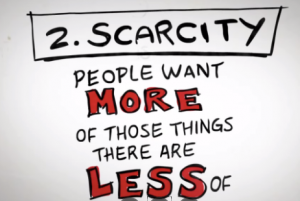Marketing, at its core, is about communicating value to consumers and influencing their behavior. While numerous tactics and tools are used to achieve this, understanding the underlying psychology behind consumer decision-making can tremendously enhance the effectiveness of marketing strategies.
Here, we delve into some psychological principles that play a vital role in shaping consumer behavior. You’ll learn how to leverage these principles and understand the psychology behind converting clicks to conversions.
1. The Law of Reciprocity
Humans have an inherent urge to return favors or reciprocate kindness. In marketing, giving your target audience something for free or offering a small gift can encourage them to reciprocate by making a purchase or referring your business to others. For instance, providing free samples, complimentary consultations, or an informative eBook may compel a customer to engage with your brand. This is one of the key principles behind landing pages with lead magnets.
2. Social Proof
People often look to the actions and opinions of others to inform their own decisions, especially in situations with perceived risk or uncertainty. Marketers can leverage social proof by displaying customer testimonials, ratings, and endorsements from trusted figures or showcasing how many people are currently using their product. These indicators can instill confidence in potential buyers.
3. The Anchoring Effect
Consumers tend to rely heavily on the first piece of information they receive, known as the anchor, when making decisions. In pricing strategies, showcasing the original price next to the discounted price creates an anchor, making the deal appear more attractive. Marketers can also use this principle to set expectations in negotiations or in the positioning of products.
4. The Scarcity Principle
The fear of missing out or losing an opportunity can be a powerful motivator. By creating a sense of scarcity through limited-time offers, exclusive products, or emphasizing low stock levels, marketers can create a sense of urgency among consumers, leading to impulsive buying behavior.

5. The Decoy Effect
Offering multiple product choices where one option is clearly less attractive compared to the others can make one of the better options seem more enticing. For example, if a small coffee is priced at $3, a medium at $4, and a large at $4.50, the medium coffee becomes the decoy, making the large coffee seem like the most value for money.
6. Loss Aversion
Psychologically, losses are more impactful on our minds than gains. Marketers can use this to their advantage by framing promotions or offers in terms of what the consumer stands to lose if they do not act. For example, “Save $10 if you buy now” can be framed as “Don’t lose your $10 saving opportunity”.
7. The Paradox of Choice
While variety is good, too many choices can overwhelm consumers and lead to indecision or choice paralysis. It’s important for marketers to strike a balance between offering enough options to cater to different preferences while not overwhelming consumers with too many choices. Simplifying the decision-making process by providing curated selections or recommendations can help.
8. The Halo Effect
When consumers have a positive impression of one aspect of a product or brand, they are likely to have a favorable view of other aspects as well. This is why brands often associate themselves with positive values, causes, or popular personalities, as it casts a ‘halo’ of positive associations around them.
9. Storytelling
Stories resonate deeply with human emotions and experiences. By incorporating storytelling into marketing campaigns, brands can form deeper connections with consumers. Whether it’s the story of how the company was founded or a customer’s experience, stories are more likely to be remembered and shared, creating an emotional bond between the brand and its audience.
10. The Endowment Effect
People tend to value things more highly simply because they own them. Allowing consumers to customize products, or offering free trials can create a sense of ownership that may lead to a purchase.
In conclusion, understanding the psychology behind marketing is not about manipulation but rather about better understanding human behavior to create value and form genuine connections with consumers. By leveraging these psychological principles, marketers can craft strategies that resonate with consumers on a deeper level, ultimately driving engagement and sales.



